We post news and comment on federal criminal justice issues, focused primarily on trial and post-conviction matters, legislative initiatives, and sentencing issues.

COMMITTEE HEARING BRINGS HOPE TO PRISONERS WITH CRACK SENTENCES
The big news this week was the Senate Judiciary Committee’s Tuesday lovefest on scrapping the disparity between crack cocaine and powder cocaine.
 The Committee conducted a hearing on S.79, The EQUAL Act (an acronym for “Eliminating a Quantifiably Unjust Application of the Law”). The Act, sponsored by Sen. Cory Booker (D-New Jersey), would correct mandatory minimum sentences in 21 U.S.C. § 841(b) so that a like amount of cocaine base (“crack”) and cocaine hydrochloride (“powder”) would dictate a like minimum sentence.
The Committee conducted a hearing on S.79, The EQUAL Act (an acronym for “Eliminating a Quantifiably Unjust Application of the Law”). The Act, sponsored by Sen. Cory Booker (D-New Jersey), would correct mandatory minimum sentences in 21 U.S.C. § 841(b) so that a like amount of cocaine base (“crack”) and cocaine hydrochloride (“powder”) would dictate a like minimum sentence.
A brief history lesson: About 35 years ago, a senator from Delaware by the name of Joe Biden co-sponsored the Anti-Drug Abuse Act of 1986. That law imposed mandatory minimum sentences for drug offenders and created a 100-to-1 sentencing disparity between crack and powder cocaine. This meant that the poor mutt caught with five grams of crack would get the same mandatory five-year minimum sentence that a dealer walking around with over a pound of cocaine powder would face. This, of course, was because that crack turned every user into a superhuman killer, all crack dealers carried assault rifles and multiple handguns, and the merest sniff of a rock of cocaine base cocaine would turn a nun into a crack whore for life.
None of that is true, of course, but that deterred Congress not in the least. What was true was that crack was much cheaper than powder, and the drug thus became the abuse-of-choice in poorer and minority communities. As a result, the much harsher crack cocaine penalties fell on minority defendants at a rate disproportional to their representation in the general population.
In later years, under pressure from criminal justice advocates who cited the wide racial disparities and massive sentences that resulted, Presidential Candidate Biden reversed his stance. Indeed, part of his 2020 campaign platform included ending the disparity.
 Congress got there first. In 2010, it passed the Fair Sentencing Act, which reduced the crack-powder disparity from 100:1 to 18:1. The original legislation as passed by the House eliminated the disparity altogether, but – as Judiciary Committee Chairman Richard Durbin (D-Illinois) confirmed during last Tuesday’s hearing – a compromise at 18:1 had to be reached in the Senate to mollify the Dinosaur Caucus, led by then-Senator Jefferson Beauregard Sessions III (R-Alabama). At the same time, the legislation was changed at Sen. Sessions’ gentle urging to eliminate retroactivity.
Congress got there first. In 2010, it passed the Fair Sentencing Act, which reduced the crack-powder disparity from 100:1 to 18:1. The original legislation as passed by the House eliminated the disparity altogether, but – as Judiciary Committee Chairman Richard Durbin (D-Illinois) confirmed during last Tuesday’s hearing – a compromise at 18:1 had to be reached in the Senate to mollify the Dinosaur Caucus, led by then-Senator Jefferson Beauregard Sessions III (R-Alabama). At the same time, the legislation was changed at Sen. Sessions’ gentle urging to eliminate retroactivity.
Retroactivity was granted retroactively in Section 404 of the First Step Act, letting people who had been sentenced under the harsh 100:1 sentencing minimums get relief.
Tuesday, the witnesses and members of the Committee are almost uniformly in favor of finally adopting the 1:1 ratio. I say “almost,” because one witness – Steve Wasserman, an assistant US attorney and vice president for defendant oppression at the National Association of Assistant United States Attorneys (actually, “vice president for policy”, which appears to be the same thing) – argued that because crack defendants tend to have more extensive criminal histories and to carry guns, the ratio should not be changed. Chairman Durbin’s rejoinder to Mr. Wasserman was, “The science is not with you.”
 On the Committee, Sen. Tom Cotton (R-Mongol Empire)* argued that the ratio should be made 1:1, but to achieve that, powder sentences should be increased to match crack offenses. In other words, his solution is 18:18. To say this was the minority view on the committee would be to give Sen. Cotton’s creative if Draconian solution too much credit.
On the Committee, Sen. Tom Cotton (R-Mongol Empire)* argued that the ratio should be made 1:1, but to achieve that, powder sentences should be increased to match crack offenses. In other words, his solution is 18:18. To say this was the minority view on the committee would be to give Sen. Cotton’s creative if Draconian solution too much credit.
Most notable was testimony given by Regina LaBelle, acting director of the White House Office of National Drug Control Policy. In what was clearly a position approved in the Oval Office, she said that the Biden administration “strongly supports” eliminating the sentencing disparity between crack and powder cocaine.
“The current disparity is not based on evidence yet has caused significant harm for decades, particularly to individuals, families, and communities of color,” LaBelle said. “The continuation of this sentencing disparity is a significant injustice in our legal system, and it is past time for it to end.”
So what would be the practical effect of such a change? When the Fair Sentencing Act passed, the U.S. Sentencing Commission responded by reducing sentencing ranges across the board for crack offenses, so that a five-year mandatory sentence for a defendant without a prior criminal history possessing 28 grams of crack equaled what the Guidelines said his sentence should be. If the ratio falls to 1:1, and if the Sentencing Commission makes the same adjustments, a hypothetical defendant with no prior record (and no sentencing enhancements) would see the following sentencing range adjustments:
These are fairly significant. Of course, there is no assurance that the powder ranges would not be adjusted upward a bit (although that is very unlikely), and the Table above does not consider the effects of Guidelines enhancements or more serious Criminal History Categories. But any way you slice it, the sentencing range changes will be substantial.
 There are many ways for this to slip ‘twixt cup and lip. The EQUAL Act could go nowhere, especially if the new crime wave sweeping America makes reform politically unpalatable. It could be amended. The Sentencing Commission is still out of commission without a quorum, and Biden has not yet appointed anyone new. The Commission, if it is functioning, may not make changes under The EQUAL Act retroactive (although that is unlikely, too). And if it is retroactive, defendants will have to apply to their sentencing judges under 18 USC § 3582(c)(2), and the judges could turn them down.
There are many ways for this to slip ‘twixt cup and lip. The EQUAL Act could go nowhere, especially if the new crime wave sweeping America makes reform politically unpalatable. It could be amended. The Sentencing Commission is still out of commission without a quorum, and Biden has not yet appointed anyone new. The Commission, if it is functioning, may not make changes under The EQUAL Act retroactive (although that is unlikely, too). And if it is retroactive, defendants will have to apply to their sentencing judges under 18 USC § 3582(c)(2), and the judges could turn them down.
Nevertheless, The EQUAL Act seems to have bipartisan support (Tom Cotton notwithstanding), and the winds – for now at least – are favorable.
—————-
* Sen. Cotton is really from Arkansas, and I mean no disrespect to the people of that great state. I would say that Sen. Cotton – aptly described by one writer as a “bobble-throated slapstick from the state of Arkansas” – has done all the disrespecting of his constituents any group of citizens should have to endure.
—————-
Senate Judiciary Committee, Examining Federal Sentencing for Crack and Powder Cocaine (June 22, 2021)
Reason, Biden Administration Endorses Legislation to End Crack Cocaine Sentencing Disparity (June 22, 2021)
Washington Post, Biden administration endorses bill to end disparity in drug sentencing between crack and powder cocaine (June 22, 2021)
– Thomas L. Root


